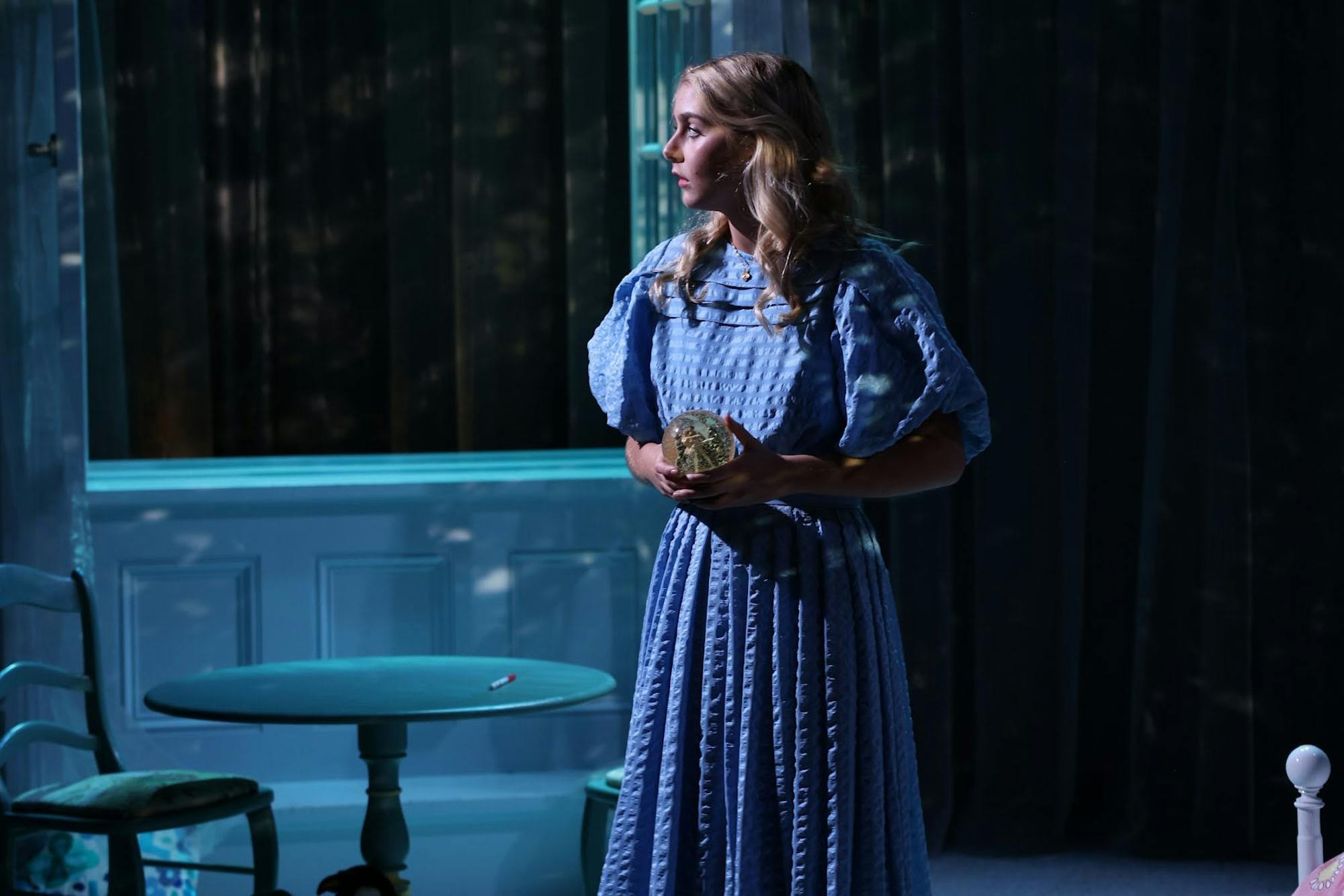On Friday, the theater department opened “Lost Girl,” Kimberly Bellflower’s play inspired by the enduring “Peter Pan” story. In “Lost Girl,” a grown-up Wendy decides that in order to move on from her first love, Peter, she must find him and take back her kiss. In her search for Peter, Wendy meets other young women with similar experiences, and she realizes that she was not the only one who Peter brought back to Neverland.
Produced in partnership with Concord Theatricals, the vulnerable production from Wendy’s perspective — solely taking place within her enshrined nursery room — presents an intimate view into the potent psychological effects of the protagonist’s childhood adventures and encounter with first love, shaping her present conviction to find Peter in search of closure.
The play is influenced by the final chapter of the original play author J. M. Barrie’s novel version of “Peter and Wendy,” in which Peter does return for Wendy years after their promise-tinged parting, only to find her traitorously grown up, according to theater professor and director Peter Hackett.
Although Belflower’s version takes a decisively different route — choosing not only to foreground Wendy’s experience, but also to alter the circumstances of Wendy and Peter’s reunion — her play nevertheless hinges on Peter’s grand consequential promise to return for Wendy and accompanying directive for her to wait for him.
“Lost Girl” is the first full production to be performed at the Currier Theater — a location across from the Black Visual Arts Center that operated in limited use over the summer. Currier Theater is currently the only available theater space, designed by Scenic Designer and theater associate professor Michael Ganio with the help of other staff, while the Hopkins Center undergoes renovation.
According to Hackett, the theater’s small size can only accommodate productions of up to 12 actors, the cast size of “Lost Girl.” He as well as Ganio and lighting and projection designer and theater professor Dan Kotlowitz articulated the challenge of building the unseen yet necessary support spaces such as storage, backstage and dressing rooms, requiring technical orchestrations from the creatives. Nevertheless, the space was uniquely suited to “Lost Girl” given its intimate scale, according to Kotlowitz.
“Things in the space that could have been restrictive … were actually to our advantage,” he said.
Aside from the intimacy of the space, the play’s script focuses on intimate and relevant themes. For Hackett, the appeal of the play stemmed both from the college age of all the characters and its “timely” nature of students’ anxiety surrounding change as a result of the COVID-19 pandemic.
“I thought it was a pretty accurate portrait of [the students’] generation … and the challenges they face and have faced and … will face after graduation,” Hackett said. “What I’ve noticed in rehearsal is how much this play speaks to the [cast]. They would be talking … about how this reminds them of their own lives and the issues [they face].”
Stage manager Caileigh Dowell ’24 stepped into her role only two weeks before opening night following the unexpected early departure of the previous post-holder. She was drawn to the play for similar reasons as Hackett.
“I think it has a lot to do with anxiety, which is something all Dartmouth students can relate to — probably all people at this point,” Dowell explained. “Just [concerning] the gut-wrenching feeling of growing up.”
During the play, audiences indeed witness the grown Wendy grapple — at times painfully so — with the meaning and source of happiness in adult life when measured against the nostalgic bliss of a fervidly-recalled yet bygone childhood.
Beyond such resonant themes, one central aspect of the production is its unique female orientation. Titular actor Julia Zichy ’27 was drawn to the play due to what she considers the contemporary resonance of Wendy’s characterization.
“I feel like every girl grows up with this idea that we need this Prince Charming, that we need this one person in our lives, and [that] … if we don’t have that, how can we be ourselves?” Zichy said. “And then we realize, ‘Oh my gosh, I don’t need a Prince Charming, I don’t need this one guy … you need to be your own woman.’”
Although the show may take root in a tale that warrants both a nostalgic evocation of childhood and a poignant reflection on adulthood, part of the power of this novel adaptation lies in its both classic and current relevance to the struggle of growing up in the aptly-named age of anxiety.
“I always think that the most important thing in theater is for an audience member to leave feeling less alone than they did when they walked in,” Dowell said. “I hope the audience realizes that, actually, we [college students] are all in this together — even though it feels very isolating.”
In a letter sent out to the cast after the last day of rehearsing, Hackett quoted the playwright Barrie who once wrote, “Those who bring sunshine to the lives of others cannot keep it from themselves.” Overall, the production of this play hopes to connect people — both among the cast and between the cast and the audience — and bring a sense of optimism.
“I think that’s what this play does,” Hackett said. “I think [that] even though you’re watching this young woman figure out how she’s going to cope with … her future, ultimately, I think the story is a very hopeful one. And I [hope] it brings sunshine into people’s lives.”
“Lost Girl,” which opened on Friday, Oct. 27, is showing at Currier Theater on Friday, Nov. 3 at 7:30 p.m. featuring a special post-show talk with the assistant directors, cast and crew, and on Saturday, Nov. 4 at 3 p.m. and 7:30 p.m. Contact the Box Office at the Hop for availability.




